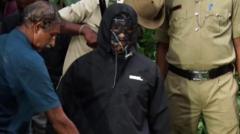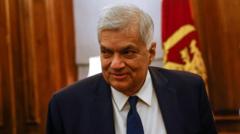On August 21, 2025, a breakthrough in the investigation surrounding the sabotage of the Nord Stream pipelines has occurred with the arrest of a Ukrainian suspect, raising questions about international sabotage and geopolitical intrigue.
Arrest Made in Nord Stream Pipeline Sabotage Case

Arrest Made in Nord Stream Pipeline Sabotage Case
Italian authorities apprehend a Ukrainian national linked to the 2022 attacks on gas pipelines between Russia and Germany.
Italian police arrested a Ukrainian national identified as Serhii K., perceived to be the previously elusive coordinator behind the 2022 bombing of the Nord Stream gas pipelines, which connected Russia to Germany. This arrest marks a significant development in the ongoing saga that has paralleled the war in Ukraine. German authorities confirmed the apprehension on August 21, 2025, emphasizing the complexity and sophistication of the act that had baffled investigators for months.
According to statements from Germany’s justice minister, Stefanie Hubig, the arrest reflects substantial investigative success, providing long-awaited answers in a case that had garnered extensive speculation regarding the perpetrators. Initially, the attacks had triggered blame toward various nations, including Russia, Poland, and the United States, but later evaluations by Western intelligence pointed towards involvement from a pro-Ukrainian faction.
The suspect, captured in Misano Adriatico, Italy, is anticipated to face extradition to Germany where he would be formally charged and tried. Prosecutors detailed that the execution of the attack involved a meticulously planned operation, with divers using an offshore sailboat secured through a shell company and forged documentation to plant explosives on both Nord Stream 1 and Nord Stream 2 pipelines.
Notably, the bombing occurred amid heightened tensions surrounding Russia's aggression toward Ukraine, prompting fears in Germany about Moscow's potential influence over European energy markets. Though the pipelines were not operational during the explosions, the incident underscored a critical point of contention in international affairs, leading to an examination of motives behind such sabotage.
Germany’s refusal to activate Nord Stream 2, combined with Russia's gas supply withdrawals from Nord Stream 1 as punitive measures against Europe’s resistance to the war—served as significant backdrops against which the sabotage event took place. Despite Ukraine’s denials of orchestrating the attacks, the operational context suggests a motive to disrupt Russian energy transport to Europe.
This arrest follows a previous warrant issued more than a year earlier for another Ukrainian individual connected to the sabotage, reinforcing the perception of an ongoing and intricate investigative process in a global landscape marked by tension and conflict. Christopher F. Schuetze, a dedicated reporter for The Times, continues to shed light on the multidimensional layers of this unfolding story, encompassing not only legal ramifications but also profound international implications.



















